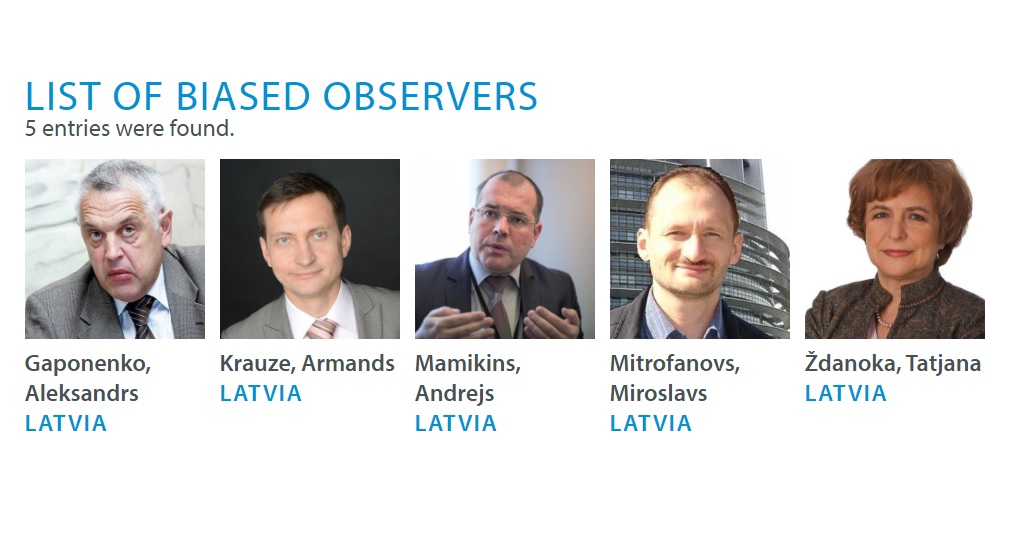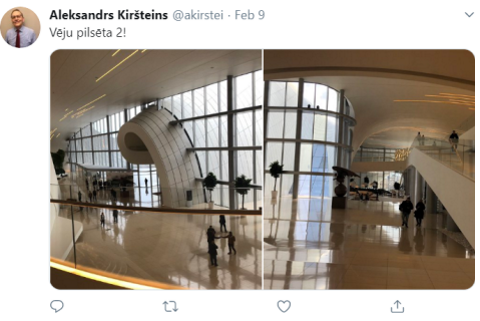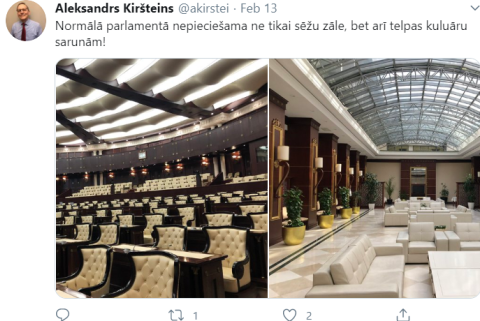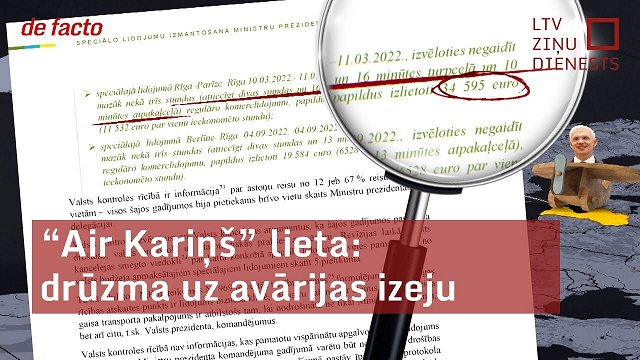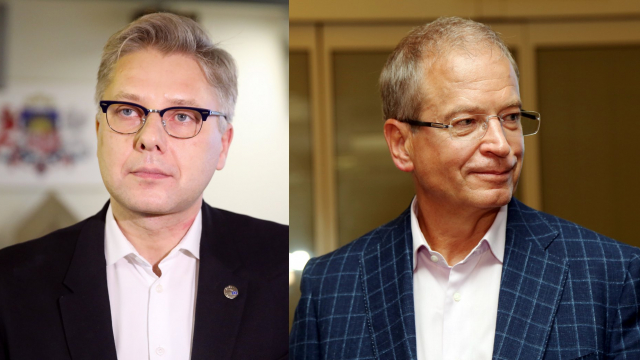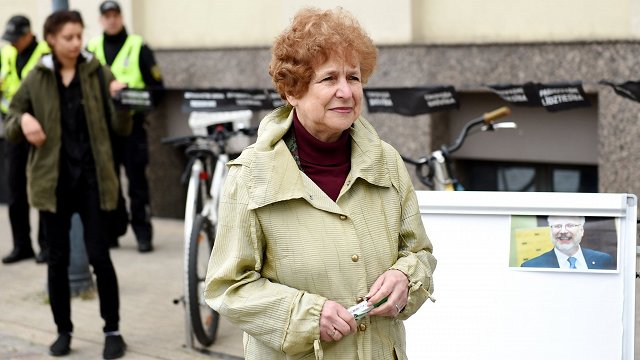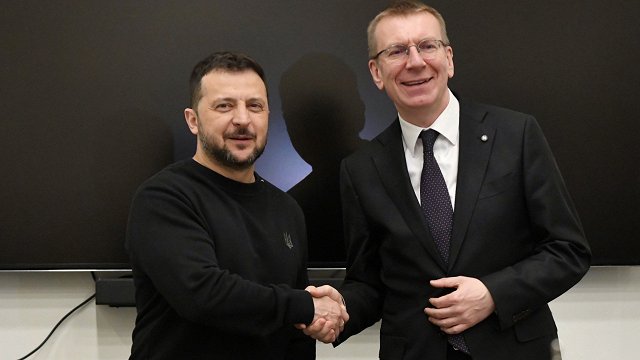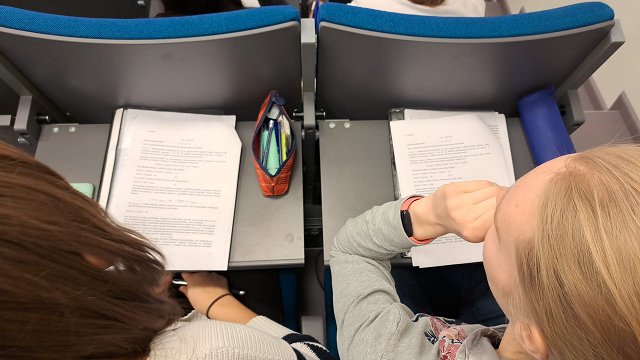Several faces from Latvia make the cut along with dozens of politicians from other countries.
The database is based on researcher Anton Shekhovtsov's reports on politically biased international observation and according to Shekhovtsov "should be of great help for all those who monitor the Kremlin’s influence in Europe and elsewhere."
Latvia has five allegedly "biased observers" listed including current and former MEPs Tatjana Ždanoka, Miroslavs Mitrofanovs (both Latvian Russian Union party), Andrejs Mamikins (formerly of the Harmony party) and well-known Russian nationalist political provocateur Aleksandrs Gaponenko, plus one sitting Latvian member of parliament, Armands Krauze of the Greens and Farmers Union political grouping.
Krauze is deputy chairman of the Saeima's parliamentary group for cooperation with Azerbaijan.
While the first four named above are selected for the backing they have given to disputed and rigged elections in Russia and occupied Ukraine, Krauze is included for his very positive assessment of parliamentary elections in Azerbaijan on February 9 this year.
"Parliamentary elections in Azerbaijan were held in accordance with high democratic standards," Krauze said, according to the official website of the elections, which features a stream of parliamentarians from various countries praising the election process to Azerbaijani media.
Krauze was pictured during his election observation press conference seated alongside another Latvian member of parliament, Aleksandrs Kiršteins of the National Alliance, though Kiršteins -- another member of the parliamentary group for cooperation with Azerbaijan -- is not included in the list of fake observers. Kiršteins has in the past expressed admiration for the country and was uploading pictures from Baku to social media including pictures from inside the parliament building between February 9 and 13.
Both Krauze and Kiršteins were back voting in Saeima debates on February 13 -- including a vote to make Krauze a member of the influential Saeima Foreign Affairs committee.
Saeima officials told LSM the pair's activities in Baku should be classed as private business trips and did not constitute an official Latvian delegation despite the impression given by Azerbaijan state media.
"The Latvian Saeima was officially represented in the observation of these elections by Romāns Naudiņš (National Alliance), a member of the Latvian delegation to the Parliamentary Assembly of the Organization for Security and Cooperation in Europe (OSCE PA)... At the same time, every member of the Saeima is free and independent in his or her activities, and he or she does not need the special consent of the parliament to participate in election observation or any other event abroad if Saeima budget funds are not used," a statement from the Saeima Press Office said.
Messrs. Krauze and Kiršteins have both been asked to comment on their reasons for making the trip by LSM.
On July 5 Mr. Kiršteins told LSM he made the trip to Baku at his own expense.
"Since it was a weekend, I didn't meet any politicians. On Sunday, I visited the parliamentary building, accompanied by a parliamentary technician, and two polling stations to see their layout and the conduct of the elections as an independent observer. The stations were set up just like in any EU country and differed nicely from what I have seen previously in CIS countries, where I have been an official observer," Kiršteins said.
He added that he had "refrained from commenting on the political situation" and did not believe that either his or his colleague Mr. Krauze's reputations would suffer as a result of their trip. He also pointed to the fact that Azerbaijan has "built the pipelines bypassing Russia to supply the EU's southern countries with energy" and said he was more concerned by elections in Armenia "which continues to illegally occupy the territory of Azerbaijan, or in Germany, whose government is financing Russia's military-industrial complex by paying the Kremlin hundreds of billions for gas."
Krauze's response is available in this separate story.
Anton Shekhovtsov told LSM July 3 that he became interested in the phenomenon of biased election observers after following events in occupied Crimea.
"I have a background in exploring the far right for more than 10 years now and I was really surprised to see objects of my research as so-called 'observers' of the so-called 'referendum' in 2014," he said.
"The idea of a database came out of a huge amount of work we had been doing and we thought it would be very helpful to be able to quickly check all those people. If we see some suspicious quote from a person we don't know yet, we could check who that person is and whether he took part in any other controversial election observation."
Azerbaijan has been following the methods pioneered by Russia, bringing in foreign officials, journalists and others who can be relied upon to make favorable comments about the election to offset likely criticism from official election observers attached to credible international organizations, Shekhovtsov explained.
"They're definitely copying the Russian method. Russia did originate this fake observation, first linked to Russian structures or Russian-dominated structures, for example the Parliamentary Assembly of the Commonwealth of Independent States but it was not really credible... Then they exported this model, and yes, Azerbaijan is a very good example but it's quite a late example."
Cambodia and parts of Africa are also seeing similar phenomena in what Shekhovtsov calls "the globalization of fake observation."
"You cannot really decide upon the fair, free and open nature of the elections on the day of the voting. You have to monitor the situation for several weeks before you can come to a conclusion," he adds.
On the question of what motivates people to take part in such questionable private election-observation roles, Shekhovtsov says there can be various reasons, ranging from naivety to a desire for a paid-for holiday in an exotic destination or a feeling of importance. Financial inducements are made in some cases, but these tend to be relatively small, he said, and political or ideological sympathies can also provide an important motivation.
For others, it is almost a way of life, Shekhovtsov explains.
"There are people who have been long engaged in this sort of activity. This is what they do. It's a business. It's not necessarily that they are paid to do this, but it's something they have to do if they want access to some of the other resources that are offered by the Russian state... for many politicians and activists, favorable election observation is a starting point for other, probably more significant pro-Kremlin activities."
According to the Organization for Security and Cooperation in Europe (OSCE) the Azerbaijani elections fell short of democratic standards in numerous regards, with the OSCE saying: "The restrictive legislation and political environment prevented genuine competition in the 9 February 2020 early parliamentary elections in Azerbaijan, despite a high number of candidates. Some prospective candidates were denied the right to stand, but candidate registration process was otherwise inclusive... However, significant procedural violations during counting and the tabulation raised concerns whether the results were established honestly."
The full OSCE report on the elections can be read online, as can Anton Shekhovstov's report on the Azerbaijan elections.
The database of election observers can be viewed online at: https://www.fakeobservers.org.
The European Platform for Democratic Elections (EPDE) was set up in December 2012 in Warsaw through 13 independent European citizen election observation organizations. The aim of EPDE is to support citizen election observation and to contribute to democratic election processes throughout Europe. The work of EPDE is financially supported among others through the European Union, the Foreign Ministries of Norway and Germany, the foundation for Polish-German Cooperation and private donations.
